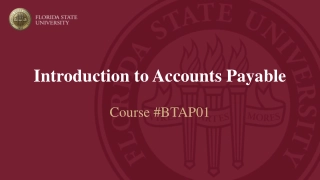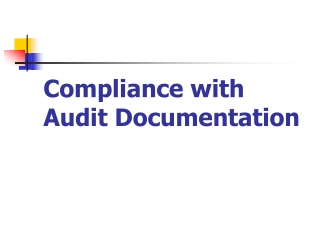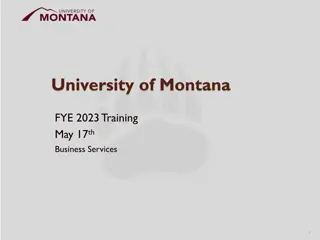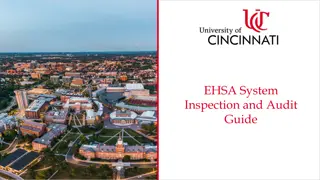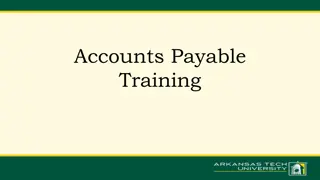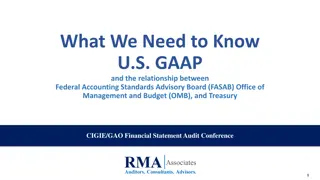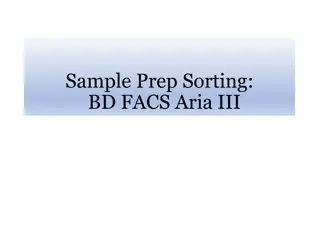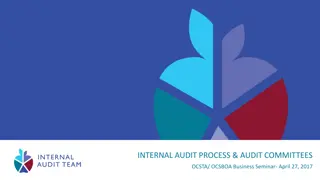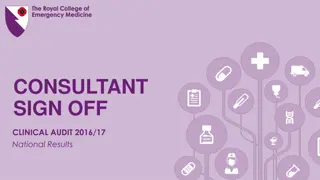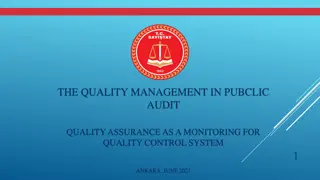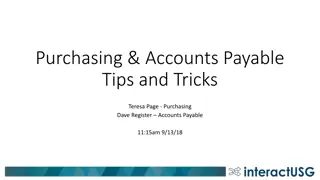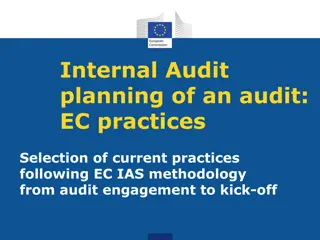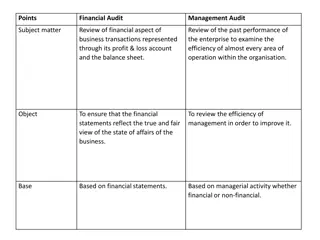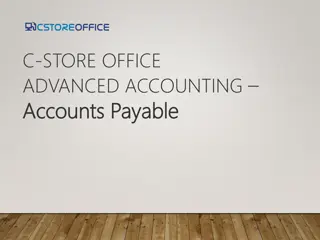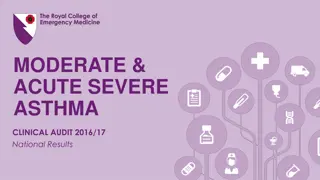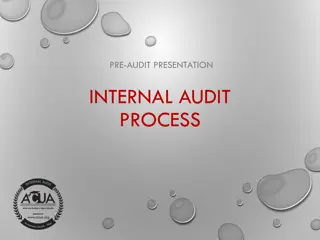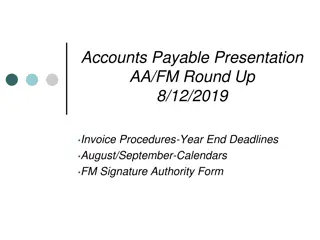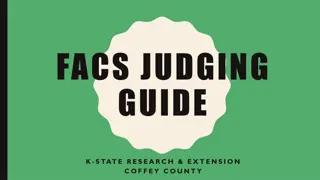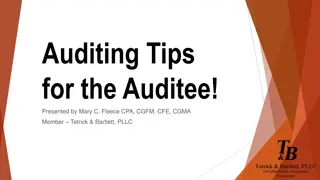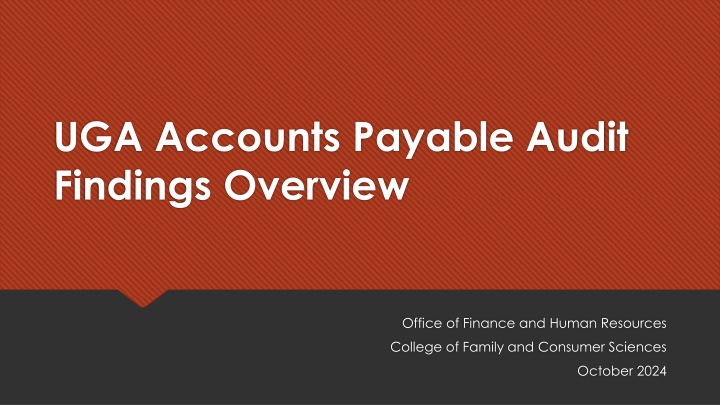
Effective Practices for Accounts Payable Audit Findings in Higher Education
Ensure compliance in accounts payable audit findings by addressing issues such as missing documentation, incorrect expense coding, and unlinked travel authorizations to expense reports. Take corrective actions to enhance transparency and accuracy in financial processes.
Uploaded on | 3 Views
Download Presentation

Please find below an Image/Link to download the presentation.
The content on the website is provided AS IS for your information and personal use only. It may not be sold, licensed, or shared on other websites without obtaining consent from the author. If you encounter any issues during the download, it is possible that the publisher has removed the file from their server.
You are allowed to download the files provided on this website for personal or commercial use, subject to the condition that they are used lawfully. All files are the property of their respective owners.
The content on the website is provided AS IS for your information and personal use only. It may not be sold, licensed, or shared on other websites without obtaining consent from the author.
E N D
Presentation Transcript
UGA Accounts Payable Audit Findings Overview Office of Finance and Human Resources College of Family and Consumer Sciences October 2024
FINDING: Missing or Incorrect Documentation Ensure travel reimbursements have adequate supporting documentation, including English translations of receipts in another language: The audit found that transactions often did not contain enough details to determine the business purpose of the expenditures. Receipts did not contain enough information to fully support the applicability of payment (e.g., seating class of airfare, no breakdown or itemization of charges for hotel expenditures, credit card statements being provided in lieu of receipt but not enough details on credit card statement to support the expenditure, lack of documentation for conversion rates, documentation that did not match the amount being reimbursed.) Lack of detail to determine business purpose Corrective Action (CA): Use notes/comments field to add more on the why of the transaction Missing invoices CA: Make sure to attach invoice/receipt for every expense Missing documentation, such as OANDA, to verify conversions amounts CA: Ensure conversion rates are shown with documentation Expense reports and documentation amounts did not match CA: Double check amounts before submitting or when approving Lack of sufficient documentation for expense reports Seating class of airfare CA: Note on business airfare Breakdown of flight receipts CA: Provide summary of flight expense Details on hotel invoices CA: Provide check out summary invoice Only submitted credit card statement which does not provide details CA: Include invoice/receipt No detailed receipt for restaurants CA: Must have itemized receipt for documentation Receipts in foreign language with no English translation. CA: Must have translated invoice/receipt.
FINDING: Use of Misc instead of specific code for expense Do not select the "Misc" expense type if a more specific code is available: The audit found transactions using MISC (miscellaneous) travel expense types rather than appropriate account codes. Use of the MISC travel expense types should be limited to scenarios where the expense does not fall into another category of expense type. Accounts Payable has recently added expense types for domestic and international parking and visa/passport expenses associated with international travel to help ensure the correct account codes are used. Corrective Action: Use the correct code for expense type. You can view a list of expense types here.
FINDING: Travel Authorizations not linked to Travel Expense Reports Ensure approved travel authorizations are electronically linked to travel expense reimbursement requests: The audit recommended that a letter of justification signed by the employee s supervisor be attached to the expense report when an expense report is submitted without an approved travel authorization, for scenarios where travel authorization is required by the travel policy. Further, the audit stated the need for travelers to clearly state the business purpose of the trip on the travel authorization. Additional information on travel authorizations is available here. Corrective Action: Ensure TA is linked or letter of justification added to expense report without an approved system TA. Here is link to attach TA to Expense Report Article - Linking a Travel Authorizat... (teamdynamix.com)
FINDING: Required Commuter Miles Not Added into each Travel Expense Report Expense reports returned for additional information when mileage reimbursements are submitted: The statewide travel regulations require that the traveler s normal commute miles be considered as personal mileage, and such, are not reimbursable when an employee elects to depart/return to their residence on a normal workday. To prevent these reimbursement requests from being returned for additional information when no commuting miles are deducted, please have the traveler note that the point of departure/return was the office rather than residence. This note ensures that the expense report has documented support for any future review/audit inquiries. This step is included on the travel reimbursement checklists. Corrective Action: If you are leaving from office, note this and document to avoid commuter miles. If you leave your residence during the work week, be sure to include commuter miles. Here is more information on commuter miles: Search | State Accounting Office (georgia.gov)
FINDING: Not Itemizing breakdown of expenses when submitting Expense reports returned with requests for itemized breakdowns: Accounts Payable also cautions the use of third-party travel booking sites such as Expedia, Kiwi, Priceline, etc. as these sites historically are problematic with respect to itemization of charges to meet our documentation requirements. Often, this lack of itemized expenses is a source of frustration when reports are returned seeking the detailed expenditures. Corrective Action: Travelers should book directly with the travel providers (e.g., hotel, car rental company, airline) when feasible to limit reimbursement delays. If you book through a third party website, you will need to provide detailed documentation on the expense.
FINDING: County, city or state tax in Georgia is added Expense reports returned for county or municipal excise tax on hotels: University employees are exempt from paying the county or municipal excise tax on lodging when traveling within the State of Georgia. Travelers are required to submit a copy of the Hotel Occupancy Tax Exemption Form upon registration at the hotel. Please ensure travelers within your unit are aware of the form and the requirement to submit it at check in.In the event the hotel refuses to honor the form, please include a note in the "Notes" field of the expense report indicating that the form was presented but the hotel refused to honor it. Corrective Action: Use the State of Georgia and Hotel Occupancy Tax Form to ensure exemption from taxes in Georgia. If there was a operator that refused to honor, please add comment in notes field.
FINDING: Budget not checked when submitting expense reports For Expense Managers -Expense reports returned for invalid budget status: Please ask Expense Managers to verify the budget status before approving an expense report to Accounts Payable. Accounts Payable is unable to process an expense report without a valid budget status. Budget checking for expense reports initiates at the top of every hour during the workday. If Expense Managers receive an error status, they should work to resolve it to a valid status before submitting to Accounts Payable. This will prevent the report from having to be returned when it reaches the Accounts Payable level. Corrective Action: Review status of budgets used in Cubes, queries or reports before submitting/approving expense reports.
FINDING: Inconsistent Per Diem Rate Usage Per diem rates are inconsistent. Differences in OneSource rates vs. US Department of State and US General Services Administration. Some deductions were based on a percentage and some on a dollar amount. Corrective Action: Ensure that correct per diems are used for in state travel (OneSource/State Accounting Office) and out of state (GSA) and overseas (Dept of State).
FINDING: Business Class Airfare Confusion across campus about the definition of business class. Use of Delta One was used when Business Class was available. Use of Business Class Airfare on grants when not allowable Per USG policy: The University System of Georgia, and therefore UGA, does not allow reimbursement of the highest level of airfare class, even for international flights. Travelers should determine if any Business Class airfare is the highest level of airfare for that flight and only seek reimbursement for the appropriate level of airfare as determined by the travel circumstances outlined in the travel policy (i.e., domestic flights to Alaska and Hawaii, international flights, or travel of employees with medical conditions.) In Delta s business model, Delta One is the highest level of business class. Any employee that uses Delta One should only seek reimbursement for the amount equivalent to the regular business class rate. Other airlines could have similar levels of airfare class or multiple tiers of business classes depending on the size of the plane. The highest level or tier of airfare class for a flight is not allowed for reimbursement. Corrective Action: Review flight expenses to determine what class was selected and ensure that it s not the highest class rate with traveler. It must not be Delta One or any other equivalent.
FINDING: Sharing of Hotel Rooms Sharing of hotel room with subordinates or employee with a student (colleagues, students, etc) during business travel is prohibited. Provost Office is updating policies and procedures to reflect. Corrective Action: Ensure that there are rooms billed per person when there is group travel including subordinate situations.
FINDING: Lack of Business Purpose Lack of documentation of Business Purpose as related to how the expenditure benefits the University and/or directly related to job duties Corrective Action: Ensure business purpose is included on the expense. Each transaction must stand alone.
FINDING: Membership Policy Not Followed UGA has specific Membership Policy with applicable exceptions Policy found here: Policy Statement The University recognizes the importance of the professional development of faculty and staff through participation in activities sponsored by their respective professional societies and may pay memberships and dues in professional associations provided that they are in the name of the University. Memberships in the name of an individual can only be paid or reimbursed if one of the following circumstances applies (regardless of fund source): 1. Job Requirement: The membership is necessary to fulfill the requirements of a job. 2. Accreditation/Licensing: The membership provides access to accreditation, licensing, or continuing education benefits with organizations that do not provide institutional memberships. 3. Cost Effective: The membership provides access to reduced rate professional development opportunities (i.e., conferences, symposiums, workshops, and training) that directly benefit the University. Corrective Action: Details to show the necessity of the membership and/or the cost advantage of purchasing the membership must be in the description/comments section of the payment request submitted for payment.
FINDING: Inadequate Training As a reminder, Accounts Payable has posted checklists to assist HR Supervisors and Expense Managers with the review process. Additionally, a UGA Travel policy refresher trainingis now available for individuals who have previously completed the comprehensive travel curriculumand may wish to revisit key points and policy requirements. CBO can assign this training These courses are strongly encouraged for all Expense Managers to complete on at least an annual basis. Corrective Action: All Employees take Training on a Annual Basis
What can FACS do? How best to share this information with travelers? Should we assign Expense Approver training? What tools or other resources can we provide? OPEN DISCUSSION
Teams are paired by subject matter: Travel, Operating, Entertainment Team Exercise Teams are groups of 4 Goal is develop templates How can we create a template for business purposes without removing the think from the process?

